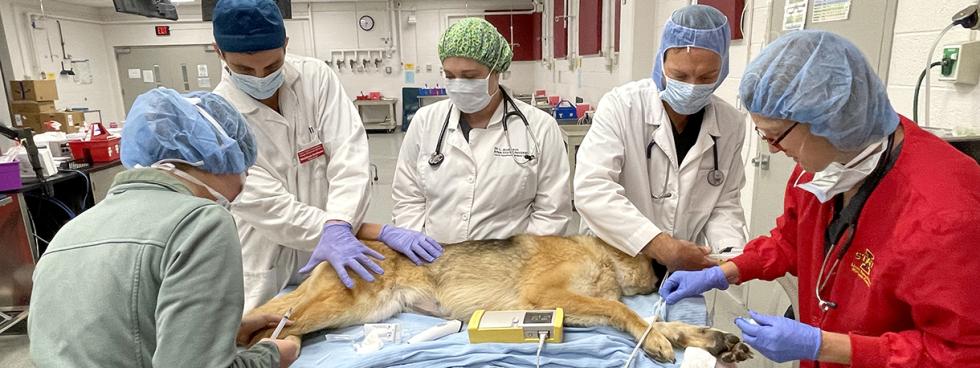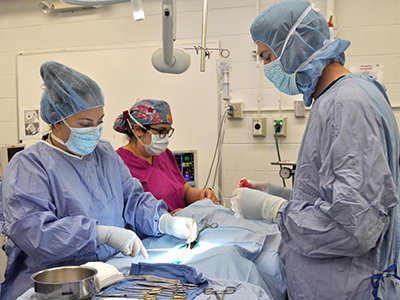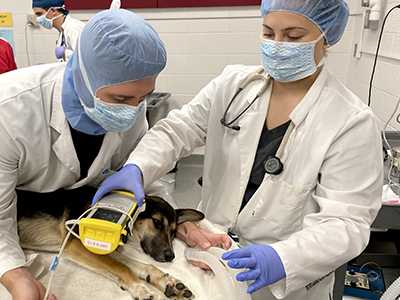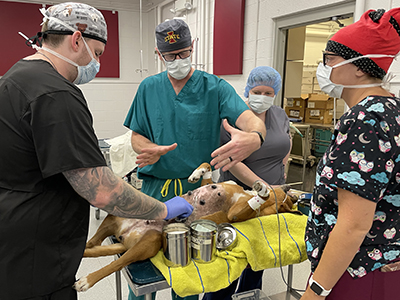
Assisting Their Fellow Students
Most students use the summer to rest, relax and forget about their studies for a few weeks.
Incoming third-year student Matt Karlheim and five of his fellow veterinary medicine students took a much different approach.
“I wanted to get a head start on the junior surgery course,” Karlheim said. “This summer I was able to perform the surgeries we would normally do in the fall and got more experience than I otherwise would have.”
Karlheim and the five other veterinary students were the inaugural participants in the summer surgery, anesthesia, and community outreach program. The six-week surgical externship prepared the students to serve as section coordinators for the class their fellow third-year veterinary students will take during the fall semester.
Dr. Joyce Carnevale, clinical associate professor in veterinary clinical sciences, said the externs focused on mastering both clinical and procedural skills. During the fall semester, the students will meet with faculty and create communication strategies with classmates to help facilitate course communications.
For the six weeks in the summer, the students performed spays and neuters on dogs and cats. The College of Veterinary Medicine teams up with area shelters and rescues to provide free spays and neuters, along with wellness care for the animals.
“The ability to work with shelter animals is what drew me to this program,” said Alex Miller. “The experience was invaluable, but what we are doing for the animals in shelters around Iowa throughout the summer is what I love the most.
“They are getting care they might not receive at their shelter.”
Miller says prior to this summer program, she had limited surgical experience. The program has allowed her to see a drastic improvement in her surgical skills with each procedure.
“Though we learn concepts in class, there are some things you cannot learn sitting in a classroom,” she said. “You can get an A in a class and still panic when you accidently hit a bleeder in surgery.
“Through this program not only have I learned how to perform surgery better, but also how to handle a stressful situation during surgery or anesthesia. After just four weeks I have noticed huge changes from one surgery to the next.”
Because there are only six students in the summer externship program, they receive almost a one-on-one instruction with clinicians and veterinary technicians who assist with the surgeries.
“The chance to have specialized mentorship by the variety of instructors in the course is extremely valuable,” said Ashley Hays. “It is a very special opportunity to have the clinicians give you focused areas that need improvement, as well as being told areas you are excelling in.”
Karlheim and Miller agree with their classmate.
“The one-on-one time with the doctors and technicians has been invaluable,” Miller said. “They are available to answer every question we have and can take the time to explain through concepts with us.”
Beginning in the fall the students’ roles will be reversed. Instead of being the student, they will be helping their classmates get the most out of the comprehensive clinical course.
“One of the goals of the program is to make us proficient enough to be able to direct students to where they need to go to answer their questions,” Karlheim said. “I’m excited to see who we can help our fellow classmates in the fall.”
“I know how the paperwork is done, the location of all of our supplies, and most importantly, how to think through problems,” Miller said. “I think this will be important in the fall when we have 150 or so anxious students trying to figure out how this course works.”
July 2022



